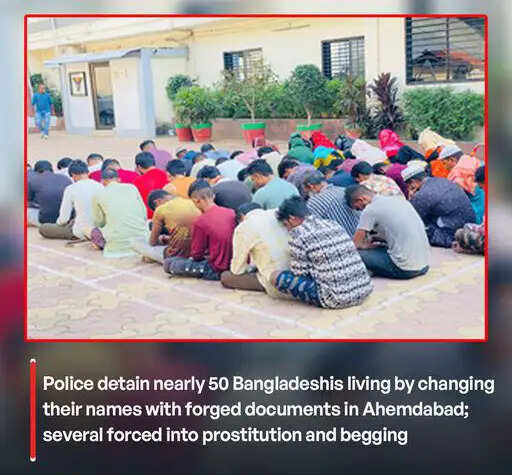Major Crackdown on Illegal Bangladeshi Nationals in Ahmedabad

Ahmedabad's crime branch did something important on Friday, October 25th: they detained 48 Bangladeshi residents who were living in the city illegally. This operation took place in places like Kubernagar and Chandola Lake, where investigations had already shown some very bad problems with fake papers and trafficking, especially of women for prostitution.
Bharat Patel, an assistant commissioner of police, said that the arrests were part of a larger plan to deal with these major crimes. Eight people were also arrested in connection with the probes. With help from central agencies, the government is now getting ready to deport these illegal people.
As part of a follow-up operation, police raided several places and questioned about 250 people they thought were Bangladeshi citizens. The results were shocking: 48 of them had been living in Ahmedabad for two to ten years without proper papers. Many of them were picked up near Chandola Lake, where they had camped out on the dry lake bed.
Patel gave information about these people's daily lives. He said that most of the men worked as labourers and some were beggars. But things were especially bad for some Bangladeshi women because investigations showed that their husbands were forcing them to be prostitutes. The police were able to track these women's calls, which showed that they were sending money back home through hawala channels, which is a common way to send money across countries without permission.
Reports say that the police action has made other Bangladeshi people living in the area very scared, and many have left their homes to escape being detained. Because of this, officials have reassured the public that they are taking all the legal steps to deport the people who were arrested.

This crackdown has brought attention to the suffering of these people, but it also brings up bigger questions about the problems in the system that cause these kinds of problems. Many of these migrants come looking for better chances, but they get stuck in a cycle of being exploited and living in the country illegally.
The government has made it clear that they will not only deal with illegal immigrants, but also look into the networks that help trafficking people. The investigations that are still going on aim to break up these networks and bring justice to the weak people who are caught up in such terrible situations.
As things go on, this shows how complicated it is for migration, law enforcement, and human rights to work together in cities like Ahmedabad. As the government works to solve these urgent problems, the community is asked to stay aware and alert.
In a city that is always busy, stories like these remind us of the hidden struggles that many people face and how important it is to fight illegal immigration and human trafficking with kindness and justice. The latest operations by the crime branch are just the start of what could be a long road to solving these big problems in society.
--
